Student Acceptance Letter
[Your Name]
[Your Address]
[City, State, ZIP Code]
[Email Address]
[Phone Number]
[Date]
[Recipient's Name]
[Recipient's Address]
[City, State, ZIP Code]
Dear [Recipient's Name],
I am delighted to inform you that you have been selected for admission to [University/College Name] for the upcoming [Academic Year] semester. On behalf of the admissions committee, I extend my heartfelt congratulations on your acceptance into our esteemed institution.
Your academic achievements, dedication, and passion for [Your Chosen Field of Study] have truly impressed us. We are confident that your presence will contribute to the diverse and dynamic academic environment that defines [University/College Name].
Please find enclosed the necessary information to complete your enrollment:
1. Enrollment Confirmation Form: This form confirms your acceptance of our offer of admission. Please complete and return it by [Enrollment Deadline].
2. Financial Aid and Scholarship Information: Details about available scholarships, grants, and financial aid options are enclosed. Ensure you review and follow the provided instructions.
3. Housing and Accommodation: If you plan to live on campus, please follow the instructions to secure your housing.
4. Orientation and Registration: Information about new student orientation and course registration will be provided closer to the start of the semester.
5. Important Dates: A list of key dates, including the start of classes, holidays, and deadlines, is enclosed for your reference.
We believe that your time at [University/College Name] will be transformative and enriching. Your unique perspective and contributions will enhance the academic community and help you grow both personally and professionally.
Once again, congratulations on your acceptance. We look forward to welcoming you to campus and embarking on this exciting educational journey together. If you have any questions or require further assistance, please do not hesitate to contact the admissions office at [Admissions Office Contact Information].
Sincerely,
[Your Name]
[Your Title]
[University/College Name]
[Admissions Office Contact Information]
University Admission Acceptance Letter
Subject: Acceptance of Admission to [University Name] - [Program Name]
Dear Admissions Committee,
I am writing to formally accept my admission to [University Name] for the [Program Name] program, beginning in [Semester/Year]. I am honored to have been selected and thrilled to join your esteemed institution.
After careful consideration of all my options, I am confident that [University Name] is the perfect fit for my academic and career goals. The program's reputation for excellence and the opportunities it offers align perfectly with my aspirations in [field of study].
I understand that I am required to submit my enrollment deposit of $[amount] by [date], which I will complete by [specific date]. I have also reviewed the academic calendar and housing information, and I am prepared to begin classes on [start date].
I would like to express my sincere gratitude to the admissions committee for this opportunity. I look forward to contributing to the university community and making the most of this educational experience.
Please let me know if you require any additional documentation or if there are any further steps I need to complete before enrollment.
Thank you once again for this wonderful opportunity.
Sincerely,
[Your Full Name]
[Student ID Number]
[Contact Information]
Scholarship Acceptance Letter
Subject: Grateful Acceptance of [Scholarship Name]
Dear [Scholarship Committee/Donor Name],
I am writing to express my heartfelt gratitude and formally accept the [Scholarship Name] that has been awarded to me. This generous support means more than words can express, and I am deeply honored to be selected as a recipient.
This scholarship will significantly impact my ability to pursue my education at [University Name]. As a [describe background - first-generation college student/student from low-income family/etc.], this financial assistance removes a substantial barrier and allows me to focus entirely on my academic pursuits in [field of study].
I am committed to maintaining the academic standards required for this scholarship and will provide progress reports as requested. My goal is to excel academically while also contributing to the university community through [mention specific activities or volunteer work].
Upon graduation, I plan to [describe career goals] and give back to the community, continuing the cycle of support that you have started with this scholarship.
I promise to make the most of this opportunity and represent both the scholarship program and [University Name] with distinction.
With deepest appreciation,
[Your Full Name]
[Student ID]
[Program of Study]
Graduate School Acceptance Letter
Subject: Acceptance of Admission - [Graduate Program Name]
Dear Graduate Admissions Office,
I am pleased to formally accept my admission to the [specific graduate program] at [University Name] for the [semester/year] term. Thank you for offering me this exceptional opportunity to advance my education and research interests.
I am particularly excited about working with [Professor/Advisor Name] on [research area/thesis topic] and contributing to the ongoing research in [specific field]. The program's focus on [specific aspects] aligns perfectly with my career objectives and research interests.
I have reviewed the program requirements and understand my obligations as a graduate student, including [mention specific requirements like TA duties, coursework, etc.]. I am prepared to meet these expectations and contribute meaningfully to the academic community.
I will submit all required documentation, including my enrollment confirmation and any financial paperwork, by the specified deadline of [date]. I have also secured housing arrangements and am ready to begin the program as scheduled.
I look forward to joining the graduate community at [University Name] and beginning this next chapter of my academic journey.
Best regards,
[Your Full Name]
[Undergraduate Institution]
[Intended Research Area]
Study Abroad Program Acceptance Email
Subject: Excited to Accept - [Study Abroad Program Name]
Dear [Program Coordinator/International Office],
I am thrilled to accept my placement in the [Study Abroad Program Name] for [semester/year] at [Host University/Location]. This opportunity represents a dream come true, and I cannot wait to begin this international educational adventure.
I understand the program includes [mention key components like coursework, internships, cultural activities] and I am prepared to fully engage with all aspects of the experience. I am particularly excited about [specific aspects of the program or location].
I have begun preparing for the practical aspects of studying abroad, including passport renewal, visa applications, and researching housing options. I will complete all pre-departure requirements by the specified deadlines and attend all mandatory orientation sessions.
As someone who is passionate about [relevant interests/studies], I believe this international experience will provide invaluable perspective and enhance my academic and personal growth. I am committed to being an excellent ambassador for [Home University] while abroad.
Please let me know the next steps in the process and any additional information I should provide.
Looking forward to this incredible journey!
Best wishes,
[Your Name]
[Current University/Year]
[Major/Field of Study]
Internship Program Acceptance Email
Subject: Acceptance of Internship Position - [Position Title]
Dear [Hiring Manager/Program Coordinator],
I am writing to formally accept the internship position of [position title] with [Company/Organization Name] for [time period]. I am excited about this opportunity to gain practical experience in [field/industry] while contributing to your team's objectives.
Based on our discussions, I understand that my responsibilities will include [mention key duties] and I am eager to apply my academic knowledge in a professional setting. The opportunity to work on [specific projects or areas] particularly interests me and aligns well with my career goals.
I confirm my availability to begin the internship on [start date] and commit to the [duration] program. I will arrange my academic schedule to accommodate the internship requirements and maintain the performance standards expected.
I appreciate the time invested in the interview process and the confidence you have shown in selecting me for this position. I am committed to making meaningful contributions to [Company/Organization Name] while learning as much as possible.
I look forward to joining your team and beginning this valuable professional experience.
Sincerely,
[Your Full Name]
[University Name and Year]
[Major/Field of Study]
[Contact Information]
Honor Society Membership Acceptance Letter
Subject: Honored to Accept Membership in [Honor Society Name]
Dear [Honor Society Leadership],
I am deeply honored to accept membership in [Honor Society Name]. This recognition of my academic achievements means a great deal to me, and I am excited to join an organization dedicated to [mention society's mission/values].
I understand that membership comes with both privileges and responsibilities. I am committed to upholding the high standards of scholarship, leadership, and service that [Honor Society Name] represents. I plan to actively participate in society activities and contribute to our shared mission of [specific goals].
As a new member, I am particularly interested in [mention specific committee work, events, or service opportunities] and would welcome the opportunity to volunteer my time and skills in these areas.
I will attend the upcoming induction ceremony on [date] and look forward to meeting fellow members and learning more about how I can contribute to the society's continued success.
Thank you for this prestigious recognition. I am proud to represent [Honor Society Name] and commit to exemplifying its values throughout my academic and professional career.
Respectfully yours,
[Your Full Name]
[Academic Year/Class]
[Major/Field of Study]
[GPA if required]
Transfer Student Acceptance Letter
Subject: Acceptance of Transfer Admission to [University Name]
Dear Transfer Admissions Office,
I am writing to officially accept my transfer admission to [University Name] for the [semester/year] term. After careful consideration and comparison with other institutions, I am confident that [University Name] is the right choice for completing my undergraduate degree in [major].
My decision to transfer stems from [briefly explain reasons - better program fit, location, opportunities, etc.]. I believe that [University Name]'s [specific programs, resources, or opportunities] will provide the academic environment I need to achieve my educational and career goals.
I have reviewed the credit transfer evaluation and understand that [number] of my previous credits will be accepted, allowing me to graduate in [expected timeline]. I am prepared to meet with academic advisors to finalize my course plan and ensure a smooth transition.
I will submit my enrollment deposit of $[amount] by [deadline] and complete all required transfer student orientation programs. I have also begun exploring housing options and campus involvement opportunities.
Thank you for recognizing the value of my previous academic work and welcoming me into the [University Name] community. I look forward to contributing to campus life and making the most of this educational opportunity.
Sincerely,
[Your Full Name]
[Previous Institution]
[Intended Major]
[Expected Graduation Date]
What is a Student Acceptance Letter and Why is it Important
A student acceptance letter is a formal document written by a prospective student to officially confirm their decision to accept an offer of admission, scholarship, program placement, or academic opportunity. This letter serves as a binding commitment between the student and the educational institution, program, or organization.
The primary purposes include:
- Formally accepting the offered position or opportunity
- Demonstrating professionalism and appreciation
- Confirming understanding of terms and conditions
- Establishing clear communication with the receiving party
- Creating an official record of the student's commitment
- Beginning the relationship on a positive, professional note
Who Should Send Student Acceptance Letters
- Prospective undergraduate students accepting university admission
- Graduate school applicants confirming enrollment in master's or doctoral programs
- Transfer students accepting admission to new institutions
- Scholarship recipients acknowledging financial awards
- Study abroad participants confirming program participation
- Internship candidates accepting professional opportunities
- Honor society invitees accepting membership offers
- Research program participants confirming participation in academic research
- Summer program attendees accepting specialized educational opportunities
When to Send Student Acceptance Letters
Key timing scenarios include:
- After receiving admission offers - typically within 2-4 weeks of offer receipt
- Before enrollment deadlines - always submit before the stated deadline
- Following scholarship awards - promptly after notification to secure funding
- Upon program selection - when choosing between multiple opportunities
- After financial aid packages - once all financial considerations are reviewed
- Following family consultations - after discussing major decisions with family
- Before housing application deadlines - to ensure accommodation availability
- Prior to course registration periods - to maintain academic standing
How to Write and Send Student Acceptance Letters
Writing process steps:
- Research recipient details - correct names, titles, and addresses
- Review original offer - understand all terms and conditions
- Choose appropriate tone - match the formality level of the opportunity
- Structure content logically - clear acceptance, gratitude, and next steps
- Proofread carefully - ensure error-free, professional presentation
- Include necessary details - student ID, program specifics, dates
- Send promptly - don't delay once decision is made
- Keep copies - maintain records for future reference
- Follow up if needed - confirm receipt when appropriate
Requirements and Prerequisites Before Sending
Essential preparations:
- Complete decision-making process - ensure commitment is final
- Review financial obligations - understand costs and payment schedules
- Gather required information - student IDs, reference numbers, dates
- Check deadline requirements - note submission timing and methods
- Prepare supporting documents - enrollment deposits, forms, transcripts
- Confirm contact information - verify recipient details and addresses
- Review program requirements - understand academic and behavioral expectations
- Consult with advisors - seek guidance when making complex decisions
- Secure family approval - especially for significant financial commitments
Formatting Guidelines for Student Acceptance Letters
Professional formatting standards:
- Length: Typically 1-2 pages, concise but comprehensive
- Tone: Professional yet appreciative, matching the opportunity's formality
- Structure: Clear introduction, body with key details, professional closing
- Subject line: Specific and descriptive for email submissions
- Sender information: Complete contact details and relevant identifiers
- Recipient addressing: Proper titles and accurate institutional information
- Date formatting: Standard business letter dating conventions
- Signature: Handwritten for physical letters, typed name for emails
- Font and spacing: Professional fonts, appropriate sizing and spacing
Common Mistakes to Avoid When Writing Acceptance Letters
Critical pitfalls to prevent:
- Missing deadlines - submitting acceptance letters after required dates
- Incomplete information - omitting essential details like student IDs or dates
- Inappropriate tone - being too casual or overly formal for the context
- Spelling errors - particularly with institution names and recipient titles
- Accepting multiple conflicting offers - creating ethical and practical problems
- Forgetting attachments - missing required documents or forms
- Generic templates - using impersonal, obviously templated language
- Unclear commitment - ambiguous language that doesn't clearly accept the offer
- Poor formatting - unprofessional appearance that undermines credibility
After Sending Your Acceptance Letter - Follow-up Actions
Post-submission responsibilities:
- Confirm receipt - follow up if confirmation isn't received within reasonable timeframe
- Submit required documentation - transcripts, deposits, forms by specified deadlines
- Complete enrollment processes - registration, orientation, housing applications
- Maintain academic standards - continue meeting performance requirements
- Prepare for transition - academic, social, and logistical preparation
- Stay informed - monitor communications for updates and requirements
- Build relationships - begin networking with peers, faculty, and staff
- Plan finances - budget for tuition, living expenses, and related costs
- Update other applications - withdraw from programs you won't attend
Frequently Asked Questions About Student Acceptance Letters
Can I change my mind after sending an acceptance letter? While possible, it may have consequences like lost deposits or damaged relationships. Contact the institution immediately to discuss options.
Should I accept multiple offers while deciding? No, only accept offers you genuinely intend to pursue. Accepting multiple conflicting offers is unethical and can harm your reputation.
How long should I take to respond to an acceptance offer? Most institutions provide 2-4 weeks, but respond as soon as you're certain of your decision to show enthusiasm and professionalism.
Is email or postal mail better for acceptance letters? Follow the institution's preferred method. Email is faster and provides delivery confirmation, while postal mail may seem more formal for prestigious opportunities.
What if I need more time to decide? Contact the admissions office to request an extension, explaining your circumstances. Many institutions are willing to accommodate reasonable requests.
Elements and Structure of Effective Acceptance Letters
Essential components to include:
- Clear subject line - specific program or opportunity reference
- Professional greeting - appropriate titles and recipient names
- Explicit acceptance statement - unambiguous confirmation of your decision
- Gratitude expression - appreciation for the opportunity offered
- Understanding confirmation - acknowledgment of terms and conditions
- Next steps acknowledgment - awareness of upcoming requirements and deadlines
- Contact information - complete details for follow-up communication
- Professional closing - appropriate sign-off matching the letter's tone
- Signature and date - proper authentication of the document
Advantages and Disadvantages of Formal Acceptance Letters
Advantages:
- Creates professional impression and positive first relationship
- Provides official documentation of commitment and understanding
- Demonstrates appreciation and enthusiasm for the opportunity
- Establishes clear communication channel with the institution
- Shows attention to detail and commitment to professional standards
Disadvantages:
- Time-consuming to write properly and professionally
- Risk of errors that could create negative impressions
- May seem overly formal for some casual opportunities
- Creates binding commitment that may be difficult to reverse
- Requires careful attention to details and deadlines

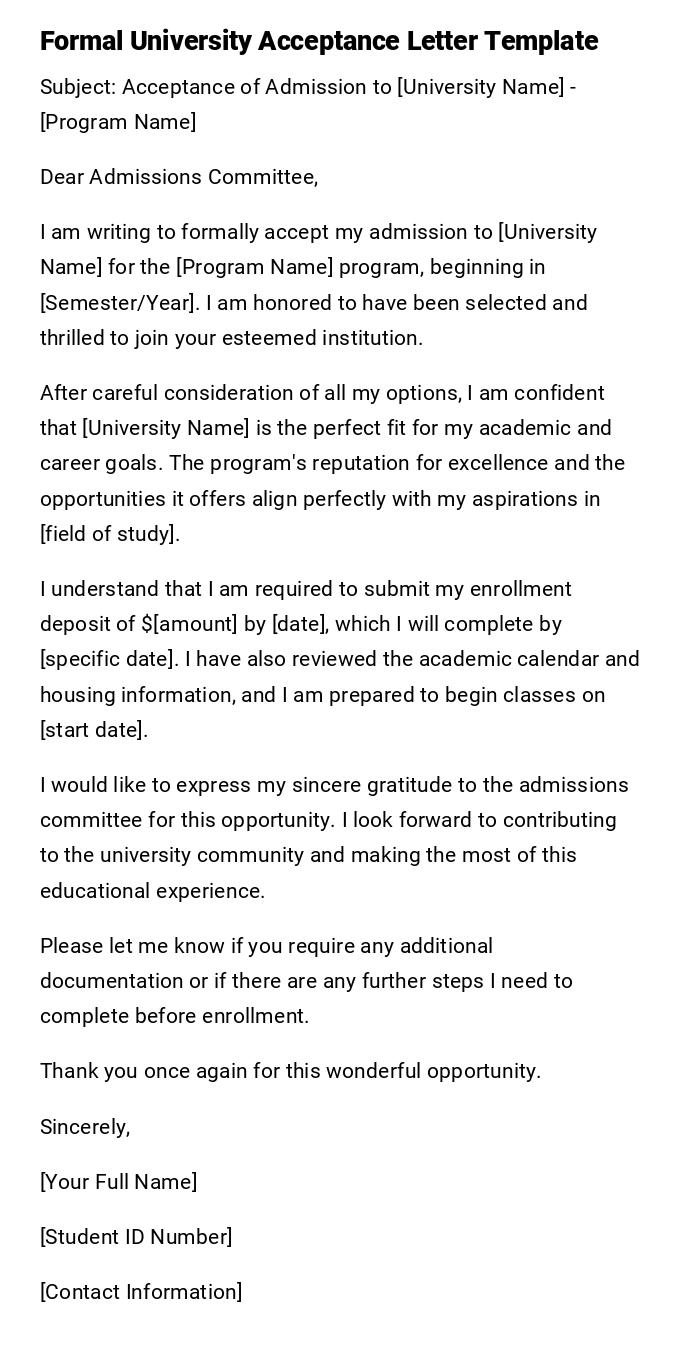
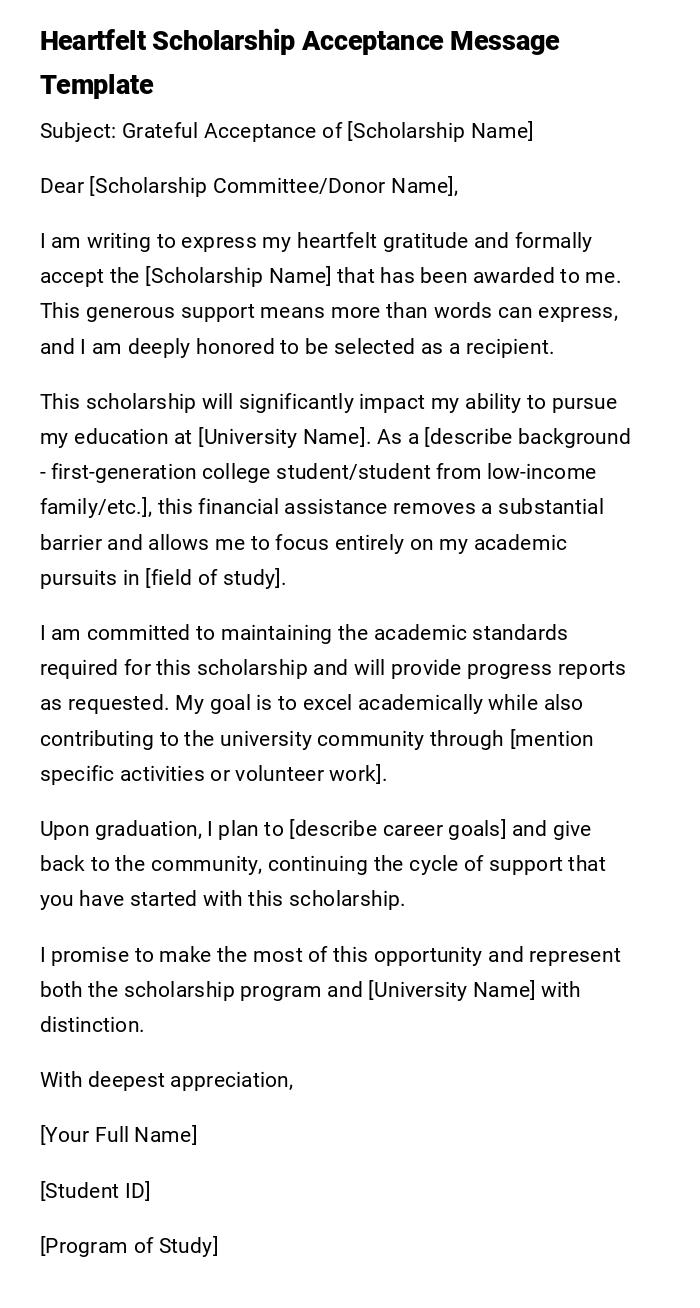
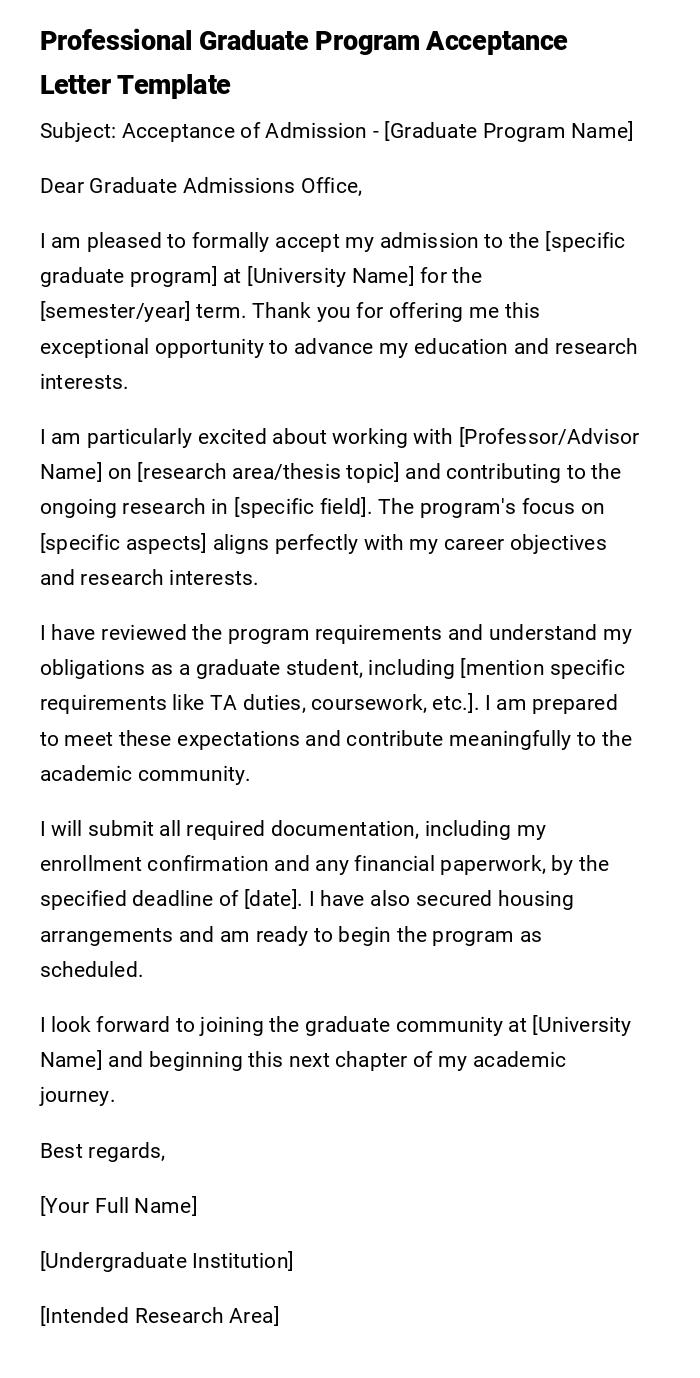
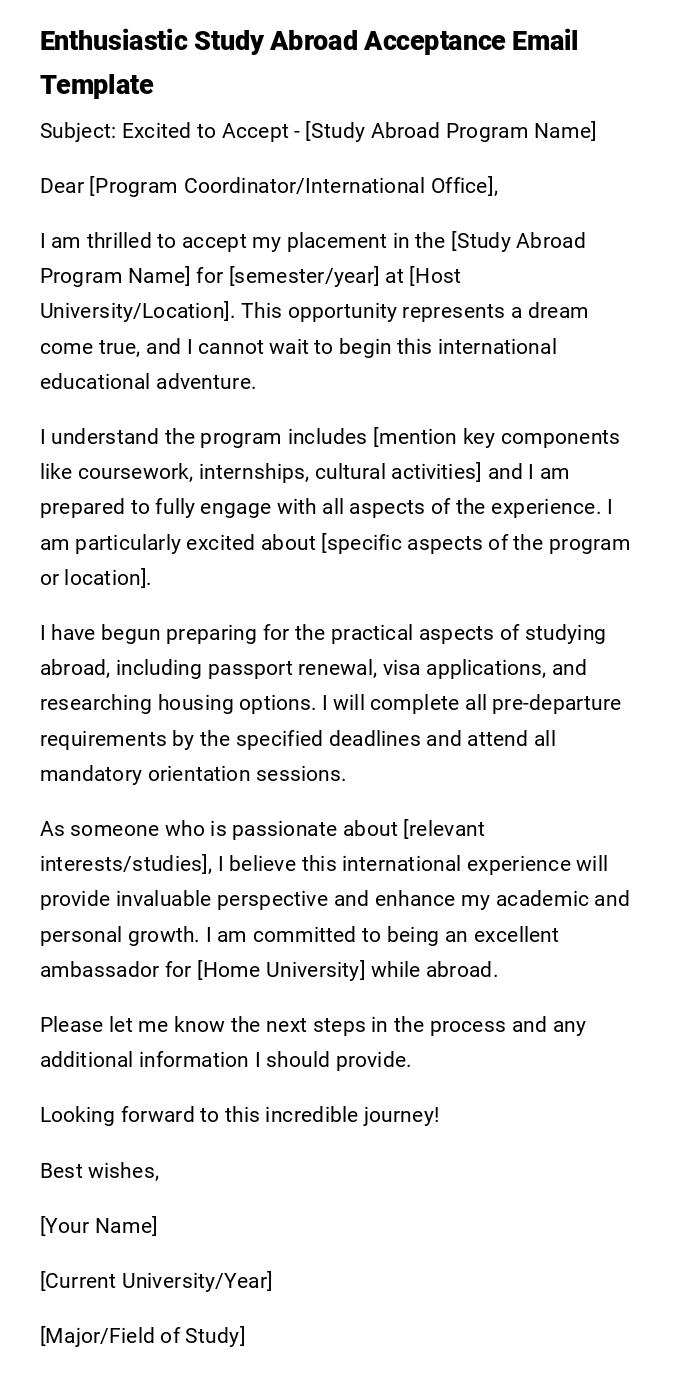
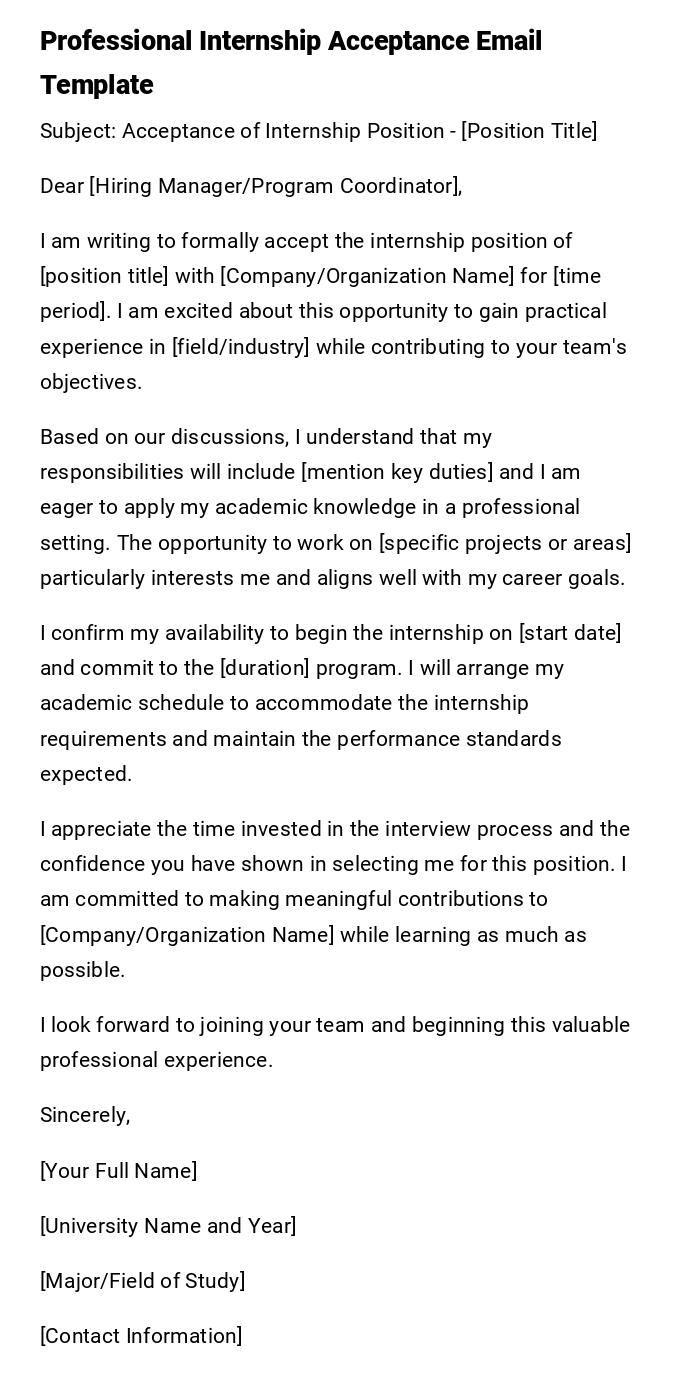
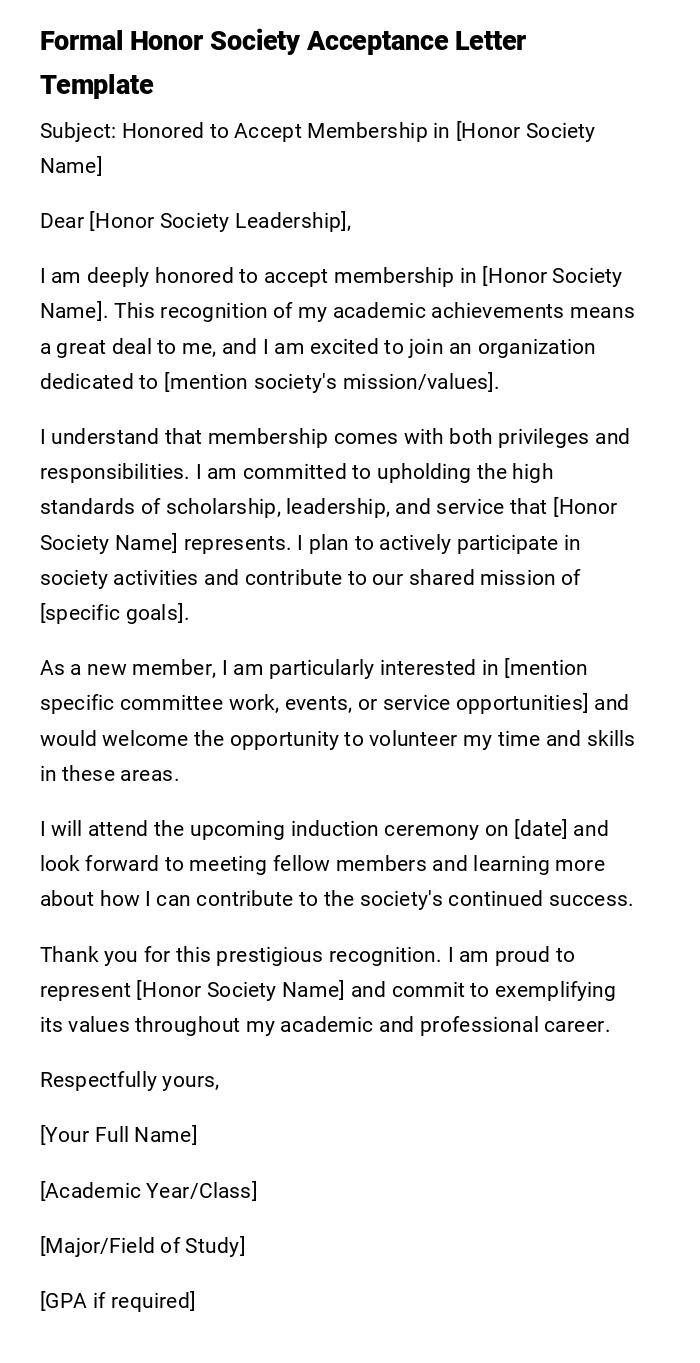
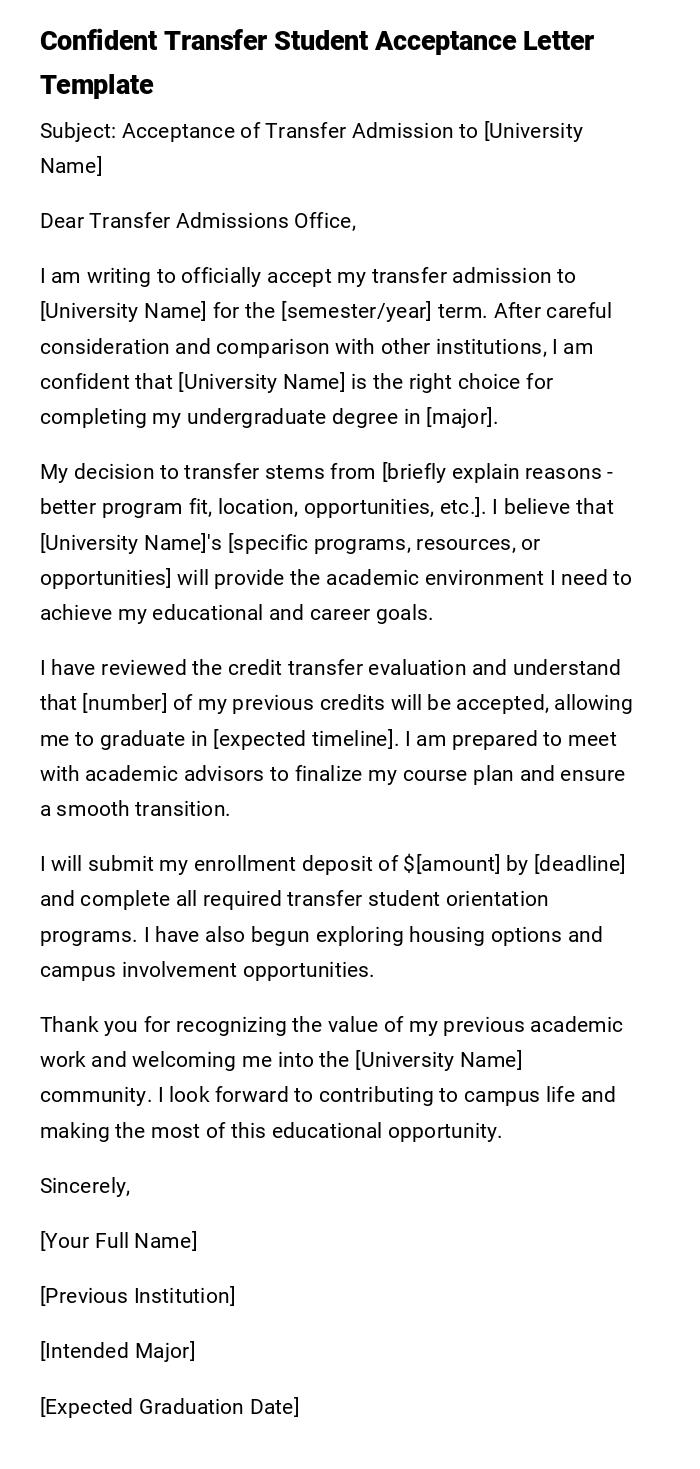

 Download Word Doc
Download Word Doc
 Download PDF
Download PDF